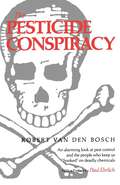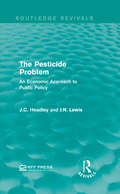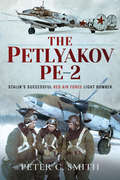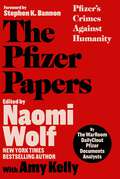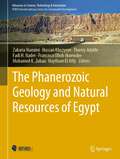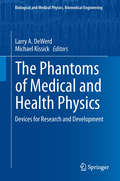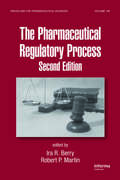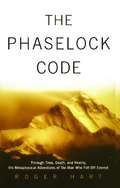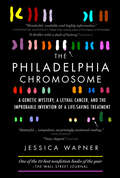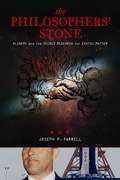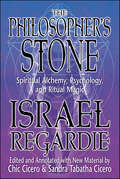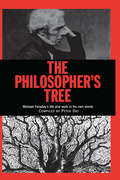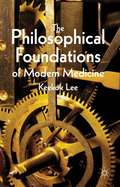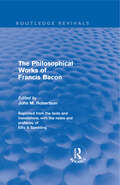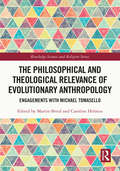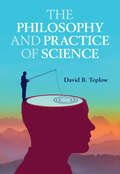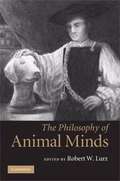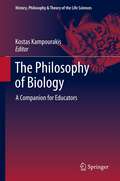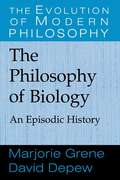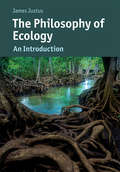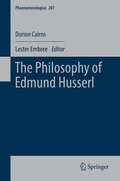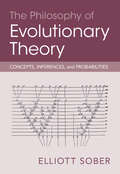- Table View
- List View
The Pesticide Conspiracy
by Robert Van Den BoschProfessor van den Bosch of the University of California was one of the developers of Integrated Pest Management—the use of biological controls, improved pest knowledge and observation, and judicious application of chemicals only when absolutely necessary. His research often suggested that less or no pesticides should be applied, which made him the target of both open and clandestine attack from industry and government figures. In protest, he wrote this passionate account of what Ecology called "the ultimate social disaster of: evolving pesticide-resistant insects, the destruction of their natural predators and parasites, emergent populations of new insect pests, downstream water pollution, atmospheric pollution, the 'accidental' killing of wildlife and people, and the bankruptcies of indigenous and small farmers."As a new Introduction to this edition recounts, some lessening of dangerous overreliance on massive pesticide applications has been achieved since van den Bosch published this book in 1978—partly as a result of its influence. But the structural problems he described remain. The book has thus become a classic, along with Rachel Carson's Silent Spring.
The Pesticide Problem: An Economic Approach to Public Policy (Routledge Revivals)
by J.C. Headley J.N. LewisThe widespread use of chemicals to control pests has resulted in adverse effects for both wildlife and humans. Originally published in 1967, this title seeks to clearly explain the key issues for understanding public policy in the pesticide problem. Authors Headley and Lewis provide simple clarification of the economic issues involved in creating public policy for pest control and present how policy formation for pesticides will be improved by further economic analysis. This title is a valuable and relevant resource for students interested in environmental studies, especially the impact of public policy making on the environment.
The Petlyakov Pe-2: Stalin's Successful Red Air Force Light Bomber
by Peter C. SmithThe definitive book on the development and deployment of the Soviet Union’s supreme dive-bomber—with rare archival and private photos.During the Second World War, the Petlyakov Pe-2 Peshka was the Soviet Union’s main dive- and light-bomber in operations across the Eastern Front. It became a mainstay of the Soviet counteroffensive that led to the fall of Berlin. They also led the way in the brief but annihilating Manchurian campaign against Japan in the closing days of the war in 1945.Conceived by a team of top aircraft designers whom Stalin had incarcerated on political charges, the Peshka had originally been designed as a high-altitude twin-engine fighter plane. But due to the outstanding success of the German Stukas in the Blitzkrieg, it was quickly transformed into the fastest dive-bomber in the skies.Only a handful had reached front lines by the start of Operation Barbarossa in June 1941. But by 1945, more than 11,000 of the type were built, including many variants. Many of these remained in service with the air forces of Yugoslavia and the Warsaw Pact countries into the 1950s. Using official sources, including the official Pe-2 handbook, as well as rare color and black-and-white photographs from both official and private collections, this is the definitive record of the Pe-2.
The Petlyakov Pe-2: Stalin's Successful Red Air Force Light Bomber
by Peter C. SmithThe definitive book on the development and deployment of the Soviet Union’s supreme dive-bomber—with rare archival and private photos.During the Second World War, the Petlyakov Pe-2 Peshka was the Soviet Union’s main dive- and light-bomber in operations across the Eastern Front. It became a mainstay of the Soviet counteroffensive that led to the fall of Berlin. They also led the way in the brief but annihilating Manchurian campaign against Japan in the closing days of the war in 1945.Conceived by a team of top aircraft designers whom Stalin had incarcerated on political charges, the Peshka had originally been designed as a high-altitude twin-engine fighter plane. But due to the outstanding success of the German Stukas in the Blitzkrieg, it was quickly transformed into the fastest dive-bomber in the skies.Only a handful had reached front lines by the start of Operation Barbarossa in June 1941. But by 1945, more than 11,000 of the type were built, including many variants. Many of these remained in service with the air forces of Yugoslavia and the Warsaw Pact countries into the 1950s. Using official sources, including the official Pe-2 handbook, as well as rare color and black-and-white photographs from both official and private collections, this is the definitive record of the Pe-2.
The Pfizer Papers: Pfizer's Crimes Against Humanity
by The WarRoom/DailyClout Pfizer Documents AnalystsThe Pfizer Papers features new reports written by WarRoom/DailyClout research volunteers, which are based on the primary source Pfizer clinical trial documents released under court order and on related medical literature. The book shows in high relief that Pfizer&’s mRNA COVID-19 vaccine clinical trial was deeply flawed and that the pharmaceutical company knew by November 2020 that its vaccine was neither safe nor effective. The reports detail vaccine-induced harms throughout the human body, including to the reproductive system; show that women suffer vaccine-related adverse events at a 3:1 ratio; expose that vaccine-induced myocarditis is not rare, mild, or transient; and, shockingly, demonstrate that the mRNA vaccines have created a new category of multi-system, multi-organ disease, which is being called &“CoVax Disease.&” Despite the fact that Pfizer committed in its own clinical trial protocol to follow the placebo arm of its trial for twenty-four months, Pfizer vaccinated approximately 95 percent of placebo recipients by March 2021, thus eliminating the trial&’s control group and making it impossible for comparative safety determinations to be made. Just as importantly, The Pfizer Papers makes it clear that the US Food and Drug Administration knew about the shortfalls of Pfizer&’s clinical trial as well as the harms caused by the company&’s mRNA COVID vaccine product, thus highlighting the FDA&’s abject failure to fulfill its mission to &“[protect] the public health by ensuring the safety, efficacy, and security of human and veterinary drugs, biological products, and medical devices.&” The Pfizer Papers offers an in-depth look at how Big Pharma, the US government, and healthcare entities stand protected behind the broad legal immunity provided by the Public Readiness and Emergency Preparedness Act (PREP Act) when creating, prescribing, and administering vaccines; and, under that shield of protection, do what is best for their bottom lines rather than for the health and well-being of Americans.
The Phanerozoic Geology and Natural Resources of Egypt (Advances in Science, Technology & Innovation)
by Zakaria Hamimi Haytham El Atfy Hassan Khozyem Thierry Adatte Fadi H. Nader Francisca Oboh-Ikuenobe Mohamed K. ZobaaThe Phanerozoic Geology and Natural Resources of Egypt includes a series of chapters written by highly qualified group of researchers whose expertise is recognized and appreciated not only in Egypt, but also in the world over. The chapters span a wide range of geological subdisciplines including tectonics, paleogeography, stratigraphy, sedimentology, paleontology, groundwater, and energy resources, just to name a few. In this regard, the book provides the reader with ample knowledge about the different facets of the fascinating and always intriguing geology of Egypt since the Precambrian time. For a junior researcher or a geoscience student, the book is a comprehensive, multidisciplinary one-stop resource that they will continue to reference and rely on for years to come. For a more experienced scientist, the book summarizes the current state of knowledge, highlights the magnitude of complexity of the geology of Egypt and northeast Africa, and reveals potential areas where future research should be directed. The book is written in simple, easy to understand English language and contains very useful high-quality illustrations. Last but not least, The Phanerozoic Geology and Natural Resources of Egypt has been reviewed and edited by world class, highly ranked geoscientists from Egypt, Europe, and USA.
The Phantoms of Medical and Health Physics
by Larry A. Dewerd Michael KissickThe purpose and subject of this book is to provide a comprehensive overview of all types of phantoms used in medical imaging, therapy, nuclear medicine and health physics. For ionizing radiation, dosimetry with respect to issues of material composition, shape, and motion/position effects are all highlighted. For medical imaging, each type of technology will need specific materials and designs, and the physics and indications will be explored for each type. Health physics phantoms are concerned with some of the same issues such as material heterogeneity, but also unique issues such as organ-specific radiation dose from sources distributed in other organs. Readers will be able to use this book to select the appropriate phantom from a vendor at a clinic, to learn from as a student, to choose materials for custom phantom design, to design dynamic features, and as a reference for a variety of applications. Some of the information enclosed is found in other sources, divided especially along the three categories of imaging, therapy, and health physics. To our knowledge, even though professionally, many medical physicists need to bridge the three catagories described above.
The Pharmaceutical Regulatory Process (Drugs and the Pharmaceutical Sciences)
by Ira R. Berry Robert P. MartinThis Second Edition examines the mechanisms and means to establish regulatory compliance for pharmaceutical products and company practices. It focuses on major legislative revisions that impact requirements for drug safety reviews, product regulatory approvals, and marketing practices. Written by top industry professionals, practicing attorneys, an
The Phaselock Code: Through Time, Death and Reality -- The Metaphysical Adventures of Man
by Roger HartONE MAN'S REMARKABLE SEARCH FOR THE ULTIMATE TRUTHS OF OUR WORLD. For Professor Roger Hart, life truly began after he almost lost his -- in a horrific fall off the slopes of Mount Everest that he miraculously survived. This near-death experience sparked a desire in him to devote his studies to the very nature of human consciousness, in order to unlock the code of reality that binds our world. On an adventure of discovery that would take him around the world, Hart would experience life-altering transcendental events in Tibet, Morocco, and Tierra del Fuego -- opening the door to a true understanding of the nature of man. In this groundbreaking volume, he explores the participation of consciousness in the creation of reality, challenging the traditional scientific view of time, space, and objectivity -- and describing in detail his own metaphysical journey, which has involved synchronicity, precognition, and telekinesis. It is an exploration of the very things that make us human -- and a quest that touches upon the meaning of life itself.
The Philadelphia Chromosome: A Genetic Mystery, A Lethal Cancer, And The Improbable Invention Of A Lifesaving Treatment
by Jessica WapnerOne of The Wall Street Journal’s 10 Best Nonfiction Books of the Year Philadelphia, 1959: A scientist scrutinizing a single human cell under a microscope detects a missing piece of DNA. That scientist, David Hungerford, had no way of knowing that he had stumbled upon the starting point of modern cancer research— the Philadelphia chromosome. It would take doctors and researchers around the world more than three decades to unravel the implications of this landmark discovery. In 1990, the Philadelphia chromosome was recognized as the sole cause of a deadly blood cancer, chronic myeloid leukemia, or CML. Cancer research would never be the same. Science journalist Jessica Wapner reconstructs more than forty years of crucial breakthroughs, clearly explains the science behind them, and pays tribute—with extensive original reporting, including more than thirty-five interviews—to the dozens of researchers, doctors, and patients with a direct role in this inspirational story. Their curiosity and determination would ultimately lead to a lifesaving treatment unlike anything before it. The Philadelphia Chromosome chronicles the remarkable change of fortune for the more than 70,000 people worldwide who are diagnosed with CML each year. It is a celebration of a rare triumph in the battle against cancer and a blueprint for future research, as doctors and scientists race to uncover and treat the genetic roots of a wide range of cancers.
The Philosopher's Stone
by Joseph P. FarrellProlific author Joseph P. Farrell, who commands a growing and devoted audience on Coast to Coast AM, Erskine Overnight, and other programs, initiates his Feral House association with The Philosopher's Stone, in which he demonstrates the connections of modern physics and ancient alchemy by investigating monatomic gold, the work of Russian astrophysicist Nikolai Kozyrev, and the fuel for the mysterious Nazi "Bell" device, Serum 525.Farrell's previous books investigated the scientific and astronomical implications of ancient monuments and the secret space operations of the Nazis who were brought into NASA to continue their highly classified research as a result of "Operation Paperclip." The author is now working with best-selling authors Richard C. Hoagland and Mike Bara on a book about secret American space programs.Chapters within The Philosopher's Stone include:The alchemical view of the physical mediumTransmutations and timeDavid Hudson's Monatomic GoldThe Platinum Group Metals and High Spin State AtomsAn Alchemical Examination of the Soviet Red Mercury LegendThe Physics of Rotation: Dr. Nikolai KozyrevH-Bombs and Torsion PhysicsThe Greater German Alchemical ReichNazis, Lasers, and Isotope EnrichmentThe Bell and Serum 525
The Philosopher's Stone: Spiritual Alchemy, Psychology, and Ritual Magic
by Israel RegardieA new edition of Regardie's classic textIn the mid-1930s, Israel Regardie had an insight into understanding alchemical writings. The result was The Philosopher's Stone, where he analyzed three 17th-century alchemical works symbolically, psychologically, and via magickal energy.Now, famed occultists Chic and Tabatha Cicero bring this book into the 21st century. The original is completely reproduced here. The Hebrew transliterations have been updated with modern styles and the text is fully annotated and explained. Added are these new features:New introductionNew illustrationsBiographical dictionaryGlossaryResource listBibliographyIndexPlus, six new original articles "The Spiritual Alchemy of the Golden Dawn," by Chic Cicero"Intro to Alchemy: A Golden Dawn Perspective," by Mark Stavish"Basic Alchemy for the Golden Dawn" and "Golden Dawn Ritual Method and Alchemy," by Samuel Scarborough"The Elixir of the Sun," by Steven Marshall"Solve Et Coagula: The Wedding of Sol and Luna," by the Ciceros
The Philosopher's Tree: A Selection of Michael Faraday's Writings
by Peter DayThis book provides a comprehensive selection of Michael Faraday's writings, taken from all aspects of his life, intimate and public. It is designed to show the relationships between his many activities, especially with the Royal Institution, for whose bicentenary this collection is published.
The Philosophical Breakfast Club
by Laura J. SnyderThe Philosophical Breakfast Club recounts the life and work of four men who met as students at Cambridge University: Charles Babbage, John Herschel, William Whewell, and Richard Jones. Recognizing that they shared a love of science (as well as good food and drink) they began to meet on Sunday mornings to talk about the state of science in Britain and the world at large. Inspired by the great 17th century scientific reformer and political figure Francis Bacon--another former student of Cambridge--the Philosophical Breakfast Club plotted to bring about a new scientific revolution. And to a remarkable extent, they succeeded, even in ways they never intended. Historian of science and philosopher Laura J. Snyder exposes the political passions, religious impulses, friendships, rivalries, and love of knowledge--and power--that drove these extraordinary men. Whewell (who not only invented the word "scientist," but also founded the fields of crystallography, mathematical economics, and the science of tides), Babbage (a mathematical genius who invented the modern computer), Herschel (who mapped the skies of the Southern Hemisphere and contributed to the invention of photography), and Jones (a curate who shaped the science of economics) were at the vanguard of the modernization of science. This absorbing narrative of people, science and ideas chronicles the intellectual revolution inaugurated by these men, one that continues to mold our understanding of the world around us and of our place within it. Drawing upon the voluminous correspondence between the four men over the fifty years of their work, Laura J. Snyder shows how friendship worked to spur the men on to greater accomplishments, and how it enabled them to transform science and help create the modern world.From the Hardcover edition.
The Philosophical Breakfast Club: Four Remarkable Friends Who Transformed Science and Changed the World
by Laura J. SnyderThe Philosophical Breakfast Club recounts the life and work of four men who met as students at Cambridge University: Charles Babbage, John Herschel, William Whewell, and Richard Jones. Recognizing that they shared a love of science (as well as good food and drink) they began to meet on Sunday mornings to talk about the state of science in Britain and the world at large. Inspired by the great 17th century scientific reformer and political figure Francis Bacon—another former student of Cambridge—the Philosophical Breakfast Club plotted to bring about a new scientific revolution. And to a remarkable extent, they succeeded, even in ways they never intended. Historian of science and philosopher Laura J. Snyder exposes the political passions, religious impulses, friendships, rivalries, and love of knowledge—and power—that drove these extraordinary men. Whewell (who not only invented the word “scientist,” but also founded the fields of crystallography, mathematical economics, and the science of tides), Babbage (a mathematical genius who invented the modern computer), Herschel (who mapped the skies of the Southern Hemisphere and contributed to the invention of photography), and Jones (a curate who shaped the science of economics) were at the vanguard of the modernization of science. This absorbing narrative of people, science and ideas chronicles the intellectual revolution inaugurated by these men, one that continues to mold our understanding of the world around us and of our place within it. Drawing upon the voluminous correspondence between the four men over the fifty years of their work, Laura J. Snyder shows how friendship worked to spur the men on to greater accomplishments, and how it enabled them to transform science and help create the modern world.
The Philosophical Foundations of Modern Medicine
by Keekok LeeAn exploration of the philosophical foundation of modern medicine which explains why such a medicine possesses the characteristics it does and where precisely its strengths as well as its weaknesses lie. Written in plain English, it should be accessible to anyone who is intellectually curious, lay persons and medical professionals alike.
The Philosophical Works of Francis Bacon (Routledge Revivals)
by John M. RobertsonFirst published in 1905, this reissued edition of The Philosophical Works of Francis Bacon is an edited collection based upon the definitive seven volume edition of 1857, translated and prefaced by Robert Leslie Ellis and James Spedding. Of great historical, philosophical and scientific interest, this collection brings together translations of Bacon’s most important works, including the Novum Organum, the De Augmentis Scientarium, the Parasceve, and the De Principiis atque Originibus, as well as works originally written in English, such as the Valerius Terminus and the Filum Labyrinthi. The reissue offers a comprehensive and provocative collection of the key writings of the man we now consider to be the father of Empiricism who popularised inductive methodologies for scientific inquiry. All works include prefaces by Robert Leslie Ellis and James Spedding, and the collection includes an introductory note from the editor John M. Robertson.
The Philosophical and Theological Relevance of Evolutionary Anthropology: Engagements with Michael Tomasello (Routledge Science and Religion Series)
by Martin Breul Caroline HelmusThis book explores the philosophical and theological significance of evolutionary anthropology and includes diverse approaches to the relationship between evolution, culture, and religion. Particular emphasis is placed on the work of Michael Tomasello, who contributes an opening chapter that tackles the role of religion in his natural history of human thinking and human morality. The first section of the book considers the philosophical foundations of evolutionary anthropology and shows that evolutionary anthropology is open to a multitude of philosophical analyses. The second part offers theological perspectives on the relationship between evolutionary and theological anthropology and between evolution and religion. The volume also reflects more broadly on the complex relationship between religion and science in the contexts of late-modern societies. It makes a significant contribution to the religion and science debate and offers performative evidence that an interdisciplinary discussion between theologians, philosophers, and natural scientists is feasible.
The Philosophy and Practice of Science
by David B. TeplowThis book is a novel synthesis of the philosophy and practice of science, covering its diverse theoretical, metaphysical, logical, philosophical, and practical elements. The process of science is generally taught in its empirical form: what science is, how it works, what it has achieved, and what it might achieve in the future. What is often absent is how to think deeply about science and how to apply its lessons in the pursuit of truth, in other words, knowing how to know. In this volume, David Teplow presents illustrative examples of science practice, history and philosophy of science, and sociological aspects of the scientific community, to address commonalities among these disciplines. In doing so, he challenges cherished beliefs and suggests to students, philosophers, and practicing scientists new, epistemically superior, ways of thinking about and doing science.
The Philosophy of Animal Minds
by Robert W. LurzThis volume is a collection of fourteen new essays by leading philosophers on issues concerning the nature, existence, and our knowledge of animal minds. The nature of animal minds has been a topic of interest to philosophers since the origins of philosophy, and recent years have seen significant philosophical engagement with the subject. However, there is no volume that represents the current state of play in this important and growing field. The purpose of this volume is to highlight the state of the debate. The issues which are covered include whether and to what degree animals think in a language or in iconic structures, possess concepts, are conscious, self-aware, metacognize, attribute states of mind to others, and have emotions, as well as issues pertaining to our knowledge of and the scientific standards for attributing mental states to animals.
The Philosophy of Biology
by Kostas KampourakisThis book brings together for the first time philosophers of biology to write about some of the most central concepts and issues in their field from the perspective of biology education. The chapters of the book cover a variety of topics ranging from traditional ones, such as biological explanation, biology and religion or biology and ethics, to contemporary ones, such as genomics, systems biology or evolutionary developmental biology. Each of the 30 chapters covers the respective philosophical literature in detail and makes specific suggestions for biology education. The aim of this book is to inform biology educators, undergraduate and graduate students in biology and related fields, students in teacher training programs, and curriculum developers about the current state of discussion on the major topics in the philosophy of biology and its implications for teaching biology. In addition, the book can be valuable to philosophers of biology as an introductory text in undergraduate and graduate courses.
The Philosophy of Biology: An Episodic History
by Marjorie Grene David DepewIs life different from the non-living? If so, how? And how, in that case, does biology as the study of living things differ from other sciences? These questions are traced through an exploration of episodes in the history of biology and philosophy. The book begins with Aristotle, then moves on to Descartes, comparing his position with that of Harvey. In the eighteenth century the authors consider Buffon and Kant. In the nineteenth century the authors examine the Cuvier-Geoffroy debate, pre-Darwinian geology and natural theology, Darwin and the transition from Darwin to the revival of Mendelism. Two chapters deal with the evolutionary synthesis and such questions as the species problem, the reducibility or otherwise of biology to physics and chemistry, and the problem of biological explanation in terms of function and teleology. The final chapters reflect on the implications of the philosophy of biology for philosophy of science in general.
The Philosophy of Ecology: An Introduction (Cambridge Introductions to Philosophy and Biology)
by James JustusEcology is indispensable to understanding the biological world and addressing the environmental problems humanity faces. Its philosophy has never been more important. In this book, James Justus introduces readers to the philosophically rich issues ecology poses. Besides its crucial role in biological science generally, climate change, biodiversity loss, and other looming environmental challenges make ecology's role in understanding such threats and identifying solutions to them all the more critical. When ecology is applied and its insights marshalled to address these problems and guide policy formation, interesting philosophical issues emerge. Justus sets them out in detail, and explores the often ethically charged dimensions of applied ecological science, using accessible language and a wealth of scientifically-informed examples.
The Philosophy of Edmund Husserl
by Dorion Cairns Lester EmbreeThe present volume containing the dissertation of Dorion Cairns is the first part of a comprehensive edition of the philosophical papers of one of the foremost disseminators and interpreters of Husserlian phenomenology in North-America. Based on his intimate knowledge of Husserl's published writings and unpublished manuscripts and on the many conversations and discussions he had with Husserl and Fink during his stay in Freiburg i. Br. in 1931-1932 Cairns's dissertation is a comprehensive exposition of the methodological foundations and the concrete phenomenological analyses of Husserl's transcendental phenomenology.The lucidity and precision of Cairns's presentation is remarkable and demonstrates the secure grasp he had of Husserl's philosophical intentions and phenomenological distinctions. Starting from the phenomenological reduction and Husserl's Idea of Philosophy, Cairns proceeds with a detailed analysis of intentionality and the intentional structures of consciousness. In its scope and in the depth and nuance of its understanding, Cairns's dissertation belongs beside the writings on Husserl by Levinas and Fink from the same period.
The Philosophy of Evolutionary Theory: Concepts, Inferences, and Probabilities
by Elliott SoberNatural selection, mutation, and adaptation are well-known and central topics in Darwin's theory of evolution and in the 20th - and 21st -century theories which grew out of it, but many other important topics are used in evolutionary biology that raise interesting philosophical questions. In this book, Elliott Sober analyses a much larger range of topics, including fitness, altruism, common ancestry, chance, taxonomy, phylogenetic inference, operationalism, reductionism, conventionalism, null hypotheses and default reasoning, instrumentalism versus realism, hypothetico-deductivism, essentialism, falsifiability, the principle of parsimony, the principle of the common cause, causality, determinism versus indeterminism, sensitivity to initial conditions, and the knowability of the past. Sober's clear philosophical analyses of these key concepts, arguments, and methods of inference will be valuable for all readers who want to understand evolutionary biology in both its Darwinian and its contemporary forms.
